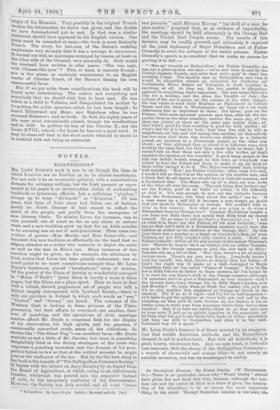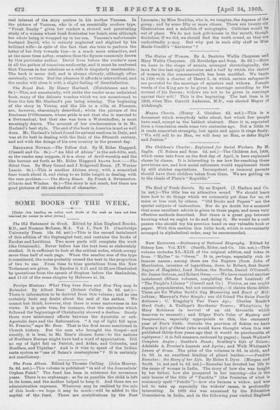An Into)hpieat Montan. By Frank Danby. (W. Heinemittin. Gs.)—Thorn is
no particular reason why "Frank Danby " Should have given her new book this title, because, although the hero., does not . end his career at Eton hi a blaze of glory, the &Scrip- Mon of bilk SChooldays is by no means tile most impoitant thing the novel, Thotikli Sehastian ltófliltdl is the here, the real interest of the story centres in his mother Vanessa. In the picture of Vanessa, who is cf an essentially modern type, "Frank Denby" gives her readers a shrewd and penetrating study of a woman wiles° head dominates her heart, even although her whole being is wrapped up in her son. Vanessa:is unfortunate husband David, who is entirely neglected and slighted by his brilliant wife—in spite of the fact that she tries to perform the letter of her duty towards him—is a much more attractive, and at the same time softer, creation than the figures commonly drawn by this particular author. David lives before tho reader's eyes in all the pathos of conscious mediocrity, and it must be confessed that Vanessa in her relations as a wife is singularly unattractive. The book is never dell, and is always cleverly, although often carelessly, written. But the pleasure it affords is intermittent, and the reader will close it with a slight feeling of dissatisfaction. The Royal End. By Henry Harland. (Hutchinson and Co. s.)—This, not unnaturally, will strike the reader as an unfinished book, many of the delicate touches which we are accustomed to from the late Mr. Harlend's pen being missing. The beginning of the story in Venice, and the life in a villa at Florence, are, however, charmingly described ; while the picture of the Duchess() D'Oltramare, whose pride is not that she is married to 13ortrandoni, but that she was born a Wohenhoffen, is most ',musingly drawn. The account of her condescension is in Mr. ilarland's best style. The end of the book in America is not so well done. Mr. Harland's talent found its natural medium in Italy, and was at its best in dealing with the Italy of the fifteenth century, and not with the doings of his own country in the present day.























































 Previous page
Previous page